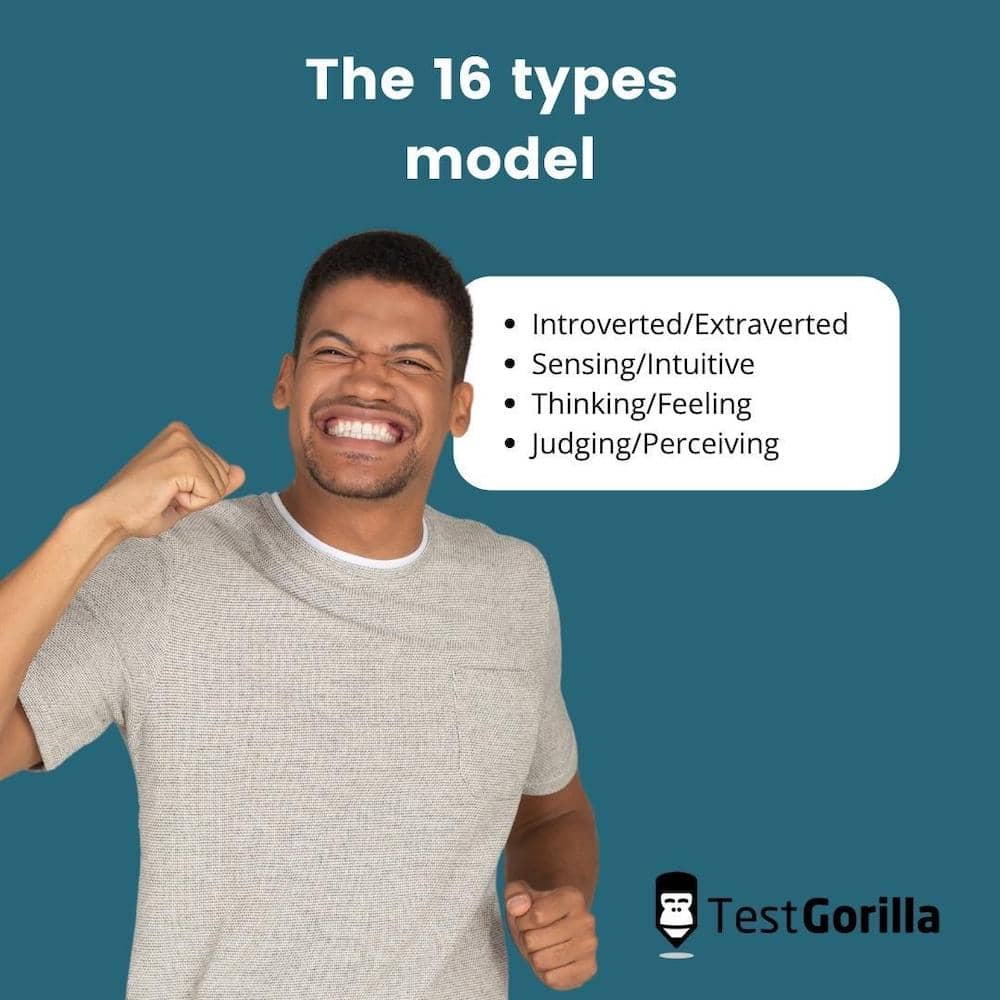Table of contents
Personality tests are a popular and verified way of adjusting hiring processes for the better. When used alongside other tests and without bias, they can open up a valuable dimension, helping you get to know your candidates on another level.
At TestGorilla, we offer four types of personality test, crafted and evaluated by experts, that you can use to ensure you make the right hiring decisions for your company and your candidates.
One of these is the 16 Personality Types test. This blog post will outline exactly what the 16 Types test is, what it can tell you about yourself, your candidates, and your employees, and what that information might mean in the workplace and when working from home.
What is the 16 Types test?
The 16 types model is based on the work of the Swiss philosopher Carl Jung, who theorized that we experience and navigate the world through 4 key binaries.
Any human personality is complicated – we all contain multitudes – but the aspects used in the 16 Types test deliver a helpful general framework that we can use to understand more about ourselves and others. They are as follows:
Introverted / Extraverted (refers to how we respond socially and interact with others)
Sensing / Intuitive (relates to how we approach information and see the world)
Thinking / Feeling (alludes to decision making and how we mediate emotion)
Judging / Perceiving (reflects how we organise and navigate work and planning)
Sixteen potential personality types can be derived from these key categories, each being a different combination of four factors.
The questions asked in the test are designed to locate answers somewhere within these four spectrums. Depending on how people answer, the test identifies which side of each they are more closely aligned with.
The results of the test take the form of four letters, one for each factor: for example, “INFJ” for Introverted Intuitive Feeling Judging, or “ESTJ” for Extraverted Sensing Thinking Judging. “N” is used for “Intuitive” to avoid confusion in repeating the letter “I”, which stands for “Introverted”.
It is important to remember that personality tests should not be used alone for pre-employment evaluation. They are a valuable tool that you can use to inform your hiring process alongside other kinds of tests to create a complete skills assessment.
Used to their full potential, they can also be helpful once successful candidates have crossed the line into employment; thoughtful and transparent application is important if you want to use the 16 Types test to help navigate team dynamics.
Used to their full potential, they can also be helpful once successful candidates have crossed the line into employment; thoughtful and transparent application is important if you want to use the 16 Types test to help navigate team dynamics.
Check out our guide on the best 16 Personalities test for hiring. You can also read up on the top alternatives to 16 Personalities tests.
The best insights on HR and recruitment, delivered to your inbox.
Biweekly updates. No spam. Unsubscribe any time.
All 16 personality types at work
In sum, this test can be a reliable way to start understanding what candidates need once you have hired them. Knowing about preferences and aversions and providing for them early can help employees settle in fast and do the job well.
This is especially true in a world where remote or semi-remote work is increasingly common. Starting a new job from home can be daunting and some personality types may need more support in grappling with the charms and vices of working from home than others.
Personality testing also presents an opportunity for us to learn about ourselves – some of us know our own working habits better than others, and we suggest using this test amongst existing employees, too.
Beginning with the extraverted types, here is a breakdown of how the 16 personality types tend to think, feel, and act in the workplace.
ENTJ – Extraverted Intuitive Thinking Judging
People with these personality traits are natural leaders, characterized by their confidence, determination, and drive. They chase momentum and achievement, rallying others behind their authority and commanding them towards a common goal. This, along with a love of challenge, means that ENTJ personality types can be powerful and effective leaders.
Leaders are needed in any workplace, but ENTJ types tend to excel in the fast-paced leadership lanes of the corporate world. Intuition, thinking, and judging make for a stunningly strategic skillset.
Curious to know which other types make great leaders? Read our guide on the 16 Personalities types best suited for leadership.
Combined with extraversion, however, these traits can lead to a projection of dominance that feels brutal, uncomfortable, or unforgiving – there can be a fine line between strong-willed confidence and arrogance or insensitivity, and it is a line that ENTJs don’t always catwalk gracefully along.
Fostering a working environment that encourages sensitivity and patience is important here, especially in situations that could become emotionally charged, or online where miscommunication is rife.
ENTJs have a momentum that can be either inspiring or oppressive, and it takes transparency and empathy to keep the balance. Nourish this momentum by making sure there is always something for it to be channeled into – ENTJ energy is priceless in moving big plans forward.
ENTP – Extraverted Intuitive Thinking Perceiving
Differing from ENTJs in the final category only, where they perceive rather than judge, ENTPs tend to be mentally agile and creative where ENTJs are forcefully decisive. Because of this, they are skilled and thoughtful debaters who can challenge the status quo and pursue new directions.
Embracing challenge and conflict, this type is all about ideas and intellect. They thrive in environments where thinking and brainstorming are always on the agenda.
Because of their shared traits with ENTJs, ENTP personalities can encounter similar weaknesses at work. A proclivity for debate is not appropriate to every scenario, and reading the room wrongly can lead to charges of insensitivity. A preoccupation with the big ideas can mean that practical details and technical execution fall by the wayside.
For balance, an ENTP type is matched well with teammates who are skilled in managing and executing practical details: this is how ideas come to fruition in any workplace. Again, encouraging transparency and empathy will help file down any argumentative edge.
Go the extra mile to ensure that digital communication, too, is carried out sensitively. Clashes can be harder to solve remotely.
ENFJ – Extraverted Intuitive Feeling Judging
These personality types are typically thoughtful and positive people. Like ENTJs, they are born leaders: they bring charisma and gentle guidance to the table, speaking out about what they believe is right. The Feeling trait makes ENFJs sensitive and sincere, and duty of care is something that they feel strongly about.
Compassion and the genuine desire to bring about positive change are invaluable qualities to have among leaders, especially those who lead social enterprises and ethically inclined projects.
Weaknesses for this type might involve being unrealistic or idealistic about the good they can do, or coming across as intense and patronizing to people who don’t share the same beliefs and convictions.
Managing expectations in the workplace is key for ENFJs. Trying to do too much good for too many people at once leads to burnout, and it is important to help employees set and maintain boundaries.
This is especially true in working from home scenarios, where the work/life divide gets blurry.
ENFP – Extraverted Intuitive Feeling Percieving
These types are people characterized by their free-spiritedness and open-mindedness. Imaginative and curious, the ‘Feeling’ and ‘Perceiving’ traits of ENFPs drive a need for connection and meaningful interaction. They experience joy and inspiration deeply.
The enthusiasm that these elements bring to their characters typically makes ENFPs a morale-boosting force in working environments. Left unchecked, however, enthusiasm can compromise focus and organization, breeding restlessness.
Being good at listening and communicating also makes ENFPs natural team players, but without boundaries, it is easy for them to shift into people-pleasing mode.
At work, people of this personality type may stumble into overcommitment, and they might need support in managing this.
Their brimming enthusiasm can result in poor self-discipline when the novelty of inspiration wears off, so they might struggle with remote working, especially since it can make those valuable connections harder to foster.
ESTJ – Extraverted Sensing Thinking Judging
People who have this personality type are likely to possess and follow sensible judgment, providing stable direction above noise and conflict at work. They are natural organizers who value facts and lead by example, consistently following through on their promises.
ESTJs have a strong sense of dedication and are characteristically honest and straightforward, making them reliable and patient. They tend to strive for truth and order, but a commitment to organization can lead to stubbornness.
The unconventional can feel uncomfortable for ESTJs, so they may find it difficult to relax or be flexible and empathetic.
Although their extroversion and affinity for order make ESTJs great for leadership and management, they might need to be nurtured and reassured through change.
At work, they will likely expect their reliability to be reciprocated by colleagues, so they work well with people who possess similar traits and priorities. This will be especially true with remote teams, where flexibility has to be a given.
ESTP – Extraverted Sensing Thinking Perceiving
All about the action and energy, this personality type is known for putting words and plans into action: no time for rumination, things can be adjusted as they go, mistakes are fixed as they appear.
ESTPs tend to be hands-on over formality, thrill over regimen. This is a great trait to have – diving bravely in can pay off, but this ESTP trait can make them risk-prone at work.
Likewise, although momentum is valuable, sometimes moving at a fast pace individually can lead to impatience with others and a breakdown in team structure.
With great social skills, this type thrives where meeting and connecting with people is concerned, so giving them opportunities to network is a great idea, be it in person or remotely.
Since they can find it challenging to slow down, think about putting them on fast-paced projects, and gently remind them that a risk assessment never goes amiss.
ESFJ – Extraverted Sensing Thinking Perceiving
People with this personality type tend to be attentive, helpful, and social. Respectful of hierarchy, this type will likely express warmth and loyalty to those around them in any setting, doing what they can to avoid conflict.
A strong sense of duty makes ESFJs loyal employees, and their sensitivity and reluctance to offend or upset ensures they are excellent team players.
This means they are sometimes too preoccupied with what people think about them, which can become a weakness. They can also take criticism badly, and be unwilling to adapt or innovate.
At work, this personality type will likely thrive most in jobs that have a social side to them. It might be an idea to make sure that criticism is delivered gently, along with any nudges to adapt.
Show your appreciation for the work they do to an equal or even greater degree; this will be especially important remotely, where warmth and good intentions are less easily felt.
ESFP – Extraverted Sensing Feeling Perceiving
People with the ESFP type tend to have a lot of excitement and energy to give to others and are extremely social people. Their Sensing and Feeling traits make them sensitive to others’ emotions, and they are usually keen to avoid conflict, and instead provide support.
Showmanship tends to be the name of the game; fine-tuned people skills and a love of originality can make ESFPs seriously fun people to work with.
All this excitement is amazing to be around but can lead to the neglect of other, more basic tasks in the workplace and bad long-term planning.
To help them knuckle down with longer-term goals, it might be worth helping people with this personality type to find focus strategies for themselves. Excitement can’t be ever-lasting, so a strong personal roadmap will be important in making sure things are followed through.
People with the ESFP personality type might struggle to sit down and focus remotely more than most.
INTJ – Introverted Sensing Thinking Judging
These types are rare, competent, and thoughtful. They tend to be highly analytical and possess a strong mind and will. Because of this, they are incredible learners, and will likely master anything they put their minds to.
Rational, clever, determined, and versatile, INTJs make up some of the world’s greatest thinkers and innovators. But their highly individual nature means they are often the lone wolf and can be extremely private as people.
This can make social and emotional situations difficult, especially since many INTJs have a critical streak that might come across to others as arrogant.
Although teamwork can be a struggle for them, these characteristics mean that working from home will suit most INTJs just fine.
They are thorough and versatile, but working self-assuredly and remotely from others might blind them from any helpful input that is on offer.
INTP – Introverted Intuitive Thinking Perceiving
People who fall into the INTP category are uniquely experimental with their intellect. They are introverted and can find extensive socializing tiring. But if they do seem distant or withdrawn, it’s usually because the cogs of their minds are turning, rich with ideas.
INTPs are well-matched with other curious minds and love to swap ideas with like-minded people. As highly analytical people they have a keen eye for detail and are good at spotting mistakes and coming up with creative solutions.
This being said, their penchant for logic can make human emotions a tad baffling, leading to disconnection and impatience.
At work, people with this personality type tend to be perfectionists and can come across as unkind without meaning to. It is worth helping them make their good intentions clear, and encouraging strategies for managing disappointment – after all, things can’t always be perfect.
INTPs can be prone to feelings of disconnection, too, so finding ways to make a team feel connected (both remotely and in the office) will go a long way.
INFJ – Introverted Intuitive Feeling Judging
People with the INFJ personality type lead with their imaginations. The rarest personality type among us, they are compassionate and versatile and are often spiritual people with strong ideals.
The passion and altruism of this type make them good at thinking about the consequences of their actions, but they can take criticism personally and tend to experience stress in the face of conflict. Their ideals can also push them towards perfectionism and a reluctance to ask for help.
It is important for this personality type to take the time to let off steam. Encouraging a healthy work/life balance, with plenty of self-care, will help them avoid perfectionism and burnout. Some are better at asking for help than others, and INFJs appreciate those moments when help is offered.
Working from home sometimes might benefit INFJs by providing more opportunities to relax, and their principled nature means they’re likely to be good at motivating themselves remotely.
INFP – Introverted Intuitive Feeling Perceiving
Similarly characterized by their altruism, INFP types are usually quiet but passionate people. Known for being sensitive, they value connection and are extremely empathetic.
INFPs tend to express themselves creatively, making great writers and artists, and they are committed to learning about themselves and others. In essence, they are dreamers, but their struggle to act on said dreams can lead to frustration. There can also be an unfortunate flipside to their empathy when they internalize others’ negative emotions.
At work, INFPs are generally good at lifting others up, expressing gratitude, and always giving credit to co-workers where it’s due. This makes them good colleagues for types who crave that kind of recognition to work with, although this can be hard to enact digitally.
INFPs are likely to struggle to work from home because their introversion can make them self-isolate and their introspective nature can make them unfocused. Reach out to INFPs who are working from home regularly, and make sure they have ways of structuring their time and managing their focus remotely.
ISTJ – Introverted Sensing Thinking Judging
The ISTJ personality type – supposedly the most common among us –takes a rational, careful and methodical approach to life. Practical and dedicated, ISTJs check the facts and turn words into actions, and are likely to value honesty and resent laziness.
Their minds are sharp and self-sufficient, with a streak of integrity and a strong inclination to follow the rules irrespective of the situation. They can sometimes see dependency on others as a weakness so may appear blunt and cold, and they tend to struggle to show outward affection.
In the workplace, they like to work alone or with authority over others so that they can set and achieve goals themselves.
This and their sense of responsibility may give them more of a fondness for work-from-home setups than most. But it is worth keeping a finger on the pulse here: their tendency for picking up where others slack means co-workers can end up leaning hard on them.
ISTP – Introverted Sensing Thinking Perceiving
Typically, ISTPs possess a curious and individualistic mindset, investigating the world without needing externally enforced structures. They love to build and make, learning best through trial and error and hands-on experience.
ISTPs can be creative and unpredictable when their mechanical approach meets with the more spontaneous and impulsive aspects of their personality. Their tendency to learn through actions rather than emotions can be difficult with relationships, especially where boundaries are concerned.
Combined with the hands-on approach, the independence that characterizes this personality type makes them good at working alone, on-site or from home. They might struggle less than others with being isolated from colleagues.
This being said, ISTPs can be vulnerable to boredom, and their boundary-pushing mentality can come with consequences among less tolerant colleagues.
ISFJ – Introverted Sensing Feeling Judging
Kind and steady, ISFJ types are likely to be attentive to practical details and reliable and generous towards other people. They are usually more social than the other introverted types, possessing an impressive ability for connecting with others and remembering things about them.
Practical and enthusiastic, they are good at taking up the mundane tasks that others might neglect out of boredom. The spotlight, however, can be uncomfortable, so guilt might kick in when they need to take credit for things at work. They can end up in danger of overload, finding it hard to ask for help.
ISFJs are generous at work, and so have great teamwork skills. They take great satisfaction in doing things well, making them generally good at working from home.
Their supportive and patient nature might make them good at helping other types who don’t take to home working so naturally, although they should be careful not to take on too much.
ISFP – Introverted Sensing Feeling Perceiving
People who have the ISFP personality type tend to be grounded, open-minded, and unconventional. Discovery, experimentation, and reinvention bring them joy, and although they are introverted, they push for these things in public and in private.
This characteristic makes high-risk activities more common with this personality type, but they are better at navigating risk than most.
ISFPs are artistic and likable, but cracks might appear when their freedom of expression is challenged or when they are competed with: it is not usually in their nature to take losing well.
This personality type will introduce bold ideas into the workplace and pursue them with vigor and curiosity. ISFPs have fierce independence that could enable them to excel at working from home, but they feel emotions strongly, so managing stress and self-esteem alone might present a challenge.
Using the 16 Types test: 4 steps for success
1. Don’t rely on personality testing alone
This is not an evaluative pre-employment test for candidates: it should be used with other tests as part of a complete skills assessment that you can design with TestGorilla.
2. Use the test within existing teams
The 16 Types test is not just for candidates: it can be used within an existing workforce to improve communication and team dynamics.
3. Consider the results in the context of remote work
Working from home can still be an uneasy territory, and this test can be a great tool for navigating it and finding out what works best for which types.
4. Use TestGorilla’s 16 Types test to hire the best
Our test is applicable to all job roles and can offer more specific tips for both candidates and their prospective colleagues.
The insight offered in this blog post is general to each type, and using our tests will give you access to more tailored information about your candidates, employees, and colleagues. Get started with a free plan today!
You've scrolled this far
Why not try TestGorilla for free, and see what happens when you put skills first.






















